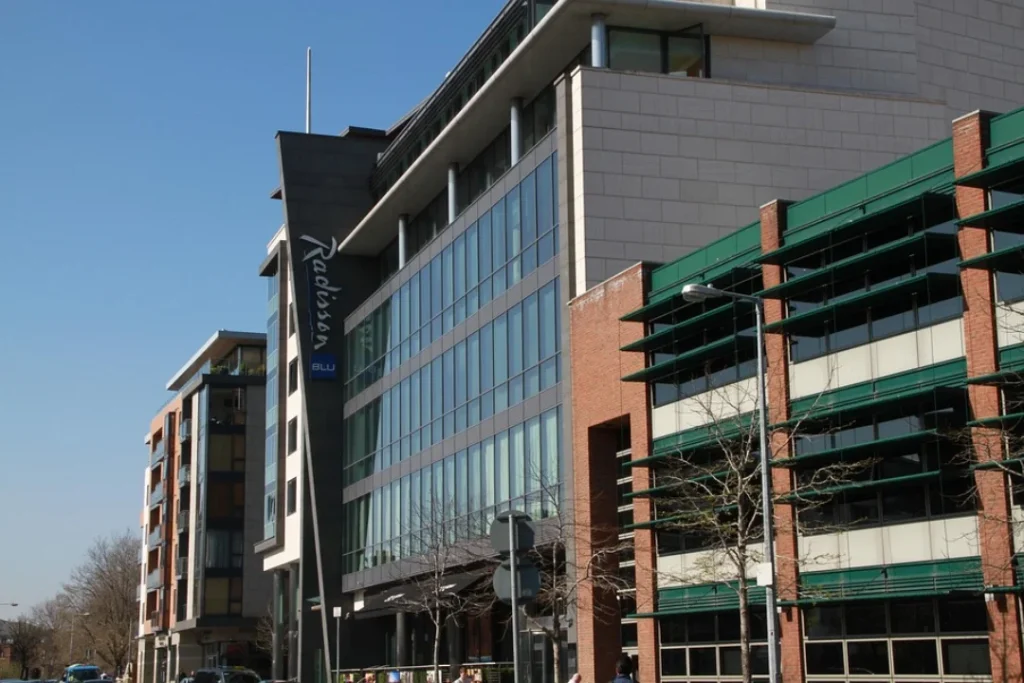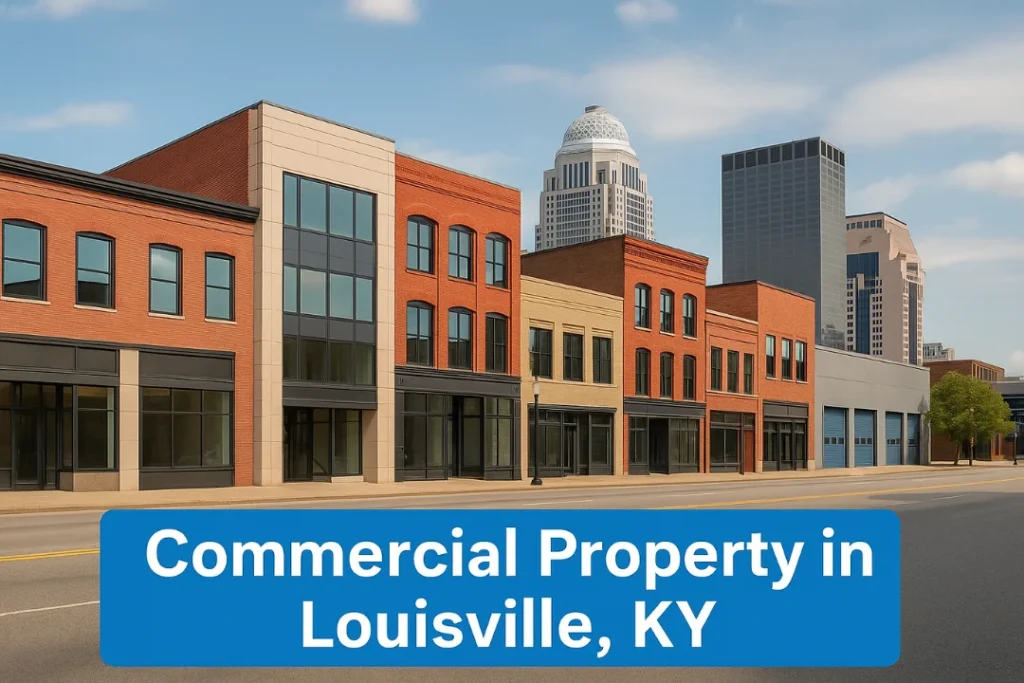Looking to break into commercial real estate investing? Louisville, KY, is quickly becoming a top contender for savvy investors. With its strategic location, thriving logistics sector, and affordable entry points, this city offers a compelling mix of growth and opportunity that sets it apart in the Midwest market.
Table of Contents
ToggleWhat to Really Look for?
When investing in commercial property in Louisville, KY, consider key factors like location, property type, and market trends. Look for areas near transportation hubs or revitalizing neighborhoods, evaluate the financials (like cap rate and cash flow), and always perform due diligence to reduce risk and maximize long-term returns.
Understanding Commercial Real Estate Valuation
Before making any investment, it’s crucial to understand how commercial properties are valued. Louisville investors typically rely on three main methods: the Income Approach (based on expected cash flow), the Sales Comparison Approach (based on similar recent sales), and the Cost Approach (value of land plus replacement cost). Knowing these helps you assess whether a property is fairly priced—and what kind of returns you can expect.
Key Factors Influencing Property Value
Several variables can make or break a commercial property’s value:
- Location: Properties near highways, downtown, or revitalized districts like NuLu often appreciate faster.
- Market Conditions: Louisville’s growing job market and steady population growth affect demand.
- Property Condition: Well-maintained or recently renovated buildings require less upfront investment.
- Tenant Mix: Long-term, reliable tenants in essential industries (like healthcare or logistics) increase stability and reduce risk.
Evaluating these factors ensures you’re investing in property with long-term growth potential.
Financial Metrics Every Investor Should Know

Understanding the numbers is key to making smart investment decisions:
- Cap Rate (Capitalization Rate): This shows your potential return on investment. In Louisville, a 6–8% cap rate is common depending on location and property type.
- NOI (Net Operating Income): The income left after operating expenses. A strong NOI signals a healthy investment.
- DSCR (Debt Service Coverage Ratio): This metric tells you if the property can cover its loan payments. A DSCR above 1.25 is considered safe by most lenders.
Mastering these metrics helps you spot profitable deals—and avoid financial traps.
Navigating Louisville’s Commercial Real Estate Landscape
Louisville is more than bourbon and baseball — it’s a city with diverse, high-potential investment zones:
- NuLu (East Market District): Once overlooked, this area has transformed into a hip, artsy commercial hub. I personally toured a mixed-use property here last year — it was fully leased within 90 days of renovation.
- Downtown Louisville: Still the city’s economic heart, offering stable office and retail investments with solid foot traffic.
- Jeffersontown: Ideal for industrial and warehouse properties. A client I worked with secured a logistics site here that saw 15% appreciation in under two years.
Each neighborhood offers unique advantages, but success hinges on knowing local trends, zoning regulations, and upcoming development plans. When in doubt, walk the area — it’s how I spot hidden gems others miss.
Due Diligence: Steps Before Making an Investment
Due diligence is the make-or-break phase of any commercial property deal. Overlooking even a single detail here can turn a promising investment into a costly mistake. Here’s how seasoned investors—and I—approach it in Louisville:
1. Physical Inspection
Always walk the property with a licensed commercial inspector. You’re not just checking for cosmetic issues—you’re evaluating structural integrity, roof age, HVAC systems, ADA compliance, and environmental risks (like asbestos or underground tanks). I once passed on a retail building in Old Louisville after discovering outdated wiring that would’ve cost six figures to upgrade.
2. Financial Review
Request and scrutinize the last 12–24 months of operating statements, rent rolls, lease agreements, and maintenance logs. Pay special attention to:
- Vacancy rates
- Tenant payment history
- Major upcoming capital expenses
For example, a multifamily property I advised on looked profitable at first glance—until we saw its top tenant was two months behind on rent and the roof had been patched four times instead of replaced.
3. Legal and Title Checks
Partner with a commercial real estate attorney to:
- Verify title ownership and check for liens or encumbrances
- Review zoning compliance and permitted uses
- Identify any easements or shared access agreements that could affect value or operations
In one of my early deals, the title search uncovered a utility easement that ran directly through planned expansion space—killing the development potential.
4. Market & Demographic Analysis
Look beyond the property and into the surrounding area. Study traffic patterns, planned infrastructure projects, and demographic trends. Louisville’s planning commission website and local commercial realtors’ reports offer useful data. I typically layer in foot traffic analytics from mobile GPS heatmaps and use that data to predict tenant demand.
Due diligence isn’t glamorous, but it’s where true investors separate themselves from speculators. Every hour spent verifying facts upfront can save you years of costly surprises later.
Financing Your Commercial Property Investment
Securing the right financing structure is just as critical as finding the right property. In Louisville’s dynamic market, how you finance your investment can determine your cash flow, risk exposure, and long-term scalability.
1. Traditional Bank Loans
These are the go-to for many first-time investors. Banks in Louisville like Stock Yards Bank or Republic Bank offer commercial real estate loans with competitive rates—but be prepared for:
- 20–30% down payment
- Strong personal and business credit
- Proven property performance (or detailed pro forma)
Local banks often have more flexibility and better knowledge of regional trends, which I’ve found advantageous when structuring terms. One client was able to negotiate interest-only payments for the first 12 months during renovations—something larger banks rarely allow.
2. SBA 504 and 7(a) Loans
For owner-occupied properties (like office or retail spaces where you plan to run your business), Small Business Administration loans are a great tool. You can get:
- Up to 90% financing
- Longer amortization (20–25 years)
- Lower down payment requirements
I worked with a small medical practice that used a 504 loan to buy a commercial condo in St. Matthews, locking in favorable terms and reducing their rent burden significantly.
3. Private and Hard Money Loans
Need to close fast or fund a value-add project with more risk? Hard money lenders offer quick approvals and asset-based underwriting. Just be cautious:
- Higher interest rates (8–12%)
- Shorter terms (6–24 months)
- Points and fees up front
I’ve used this approach for clients flipping underperforming retail strips in Shively—when speed mattered more than rate.
4. Investor Partnerships and Syndications
If you’re targeting larger deals or want to reduce your own capital exposure, forming an LLC or partnership with other investors can unlock more buying power. Just be sure to:
- Outline clear roles and profit-sharing
- Use a strong operating agreement
- Agree on exit strategies
Last year, I co-advised a three-partner deal on a flex-industrial space in Fern Valley. Pooling funds helped them land a higher-value property—and split both the risks and rewards.
Pro Tip: Always stress-test your financing plan. Calculate returns based on conservative rent projections and account for unexpected costs. Smart financing isn’t just about getting approved—it’s about setting yourself up for resilience and profit.
Property Management and Maximizing ROI
Buying the property is just the beginning—how you manage it determines whether you generate consistent returns or slowly bleed profits. In Louisville’s competitive market, smart property management is the secret to unlocking long-term value.
1. Should You Hire a Property Manager?
If you’re not local or not ready for hands-on involvement, a professional property manager is worth every penny. Look for someone who:
- Knows the Louisville market well
- Has experience managing your property type (retail, multifamily, office, etc.)
- Uses tech for tenant portals, rent collection, and maintenance requests
I once worked with an out-of-state investor who underestimated tenant turnover until we brought in a local manager. Within three months, occupancy improved and delinquent payments dropped by 40%.
2. Maintenance: Proactive vs. Reactive
Think long-term. Routine maintenance might feel like a cost, but deferred repairs lead to:
- Higher vacancy rates
- Poor tenant satisfaction
- Lower appraisals when you refinance or sell
I recommend scheduling quarterly walk-throughs and setting aside at least 5–10% of your gross rent for capital expenditures (CapEx). One client avoided a $25,000 emergency roof repair by proactively sealing minor cracks six months earlier.
3. Tenant Relationships Matter More Than You Think
Good tenants = stable income. Build relationships by:
- Responding quickly to maintenance issues
- Being fair but firm with lease terms
- Offering lease renewal incentives for reliable tenants
In one mixed-use property I helped manage in Clifton, a strong tenant relationship led to a café tenant renewing for five years—at a 7% rent increase—because they felt genuinely supported.
4. Boosting ROI with Value-Add Strategies
To maximize your property’s return:
- Rebrand or modernize outdated signage and exterior
- Subdivide underutilized space to accommodate multiple tenants
- Upgrade lighting, HVAC, or windows for energy efficiency (and potential tax incentives)
Even simple improvements like parking lot resurfacing or landscaping can command higher rents and attract better-quality tenants.
Bottom Line: Property management isn’t just about keeping the lights on—it’s your lever for profitability, tenant retention, and long-term equity growth.
Emerging Trends in Louisville’s Commercial Real Estate
Staying ahead of the curve is essential in commercial real estate. In Louisville, several trends are shaping where and how investors deploy their capital:
1. Tech-Integrated Properties
Smart buildings with features like automated HVAC, security, and energy monitoring are gaining traction. Tenants—especially in office and medical sectors—are showing a preference for tech-enabled spaces that improve operational efficiency and tenant comfort.
2. Sustainability and Green Standards
LEED-certified and energy-efficient buildings are becoming more desirable, particularly among corporate tenants and medical users. Properties with solar panels, high-efficiency HVAC, and sustainable design can command higher lease rates and qualify for state or federal tax credits.
3. Shift in Office Space Usage
Post-pandemic, hybrid work models have led to more demand for smaller, flexible office spaces rather than large, traditional layouts. Investors should look for properties that can be subdivided or adapted to meet these evolving needs.
4. Industrial and Flex-Space Demand
Louisville’s position as a logistics hub (thanks to UPS Worldport and major highways) continues to drive demand for warehouse, distribution, and flex-use space. This segment remains one of the most resilient and high-performing in the local market.
5. Neighborhood Revitalization
Areas like Shelby Park and Smoketown are seeing a rise in mixed-use developments and adaptive reuse projects. These neighborhoods, once overlooked, are now catching investor interest due to their affordability and cultural appeal.
Keeping an eye on these trends allows you to anticipate market shifts and make more strategic investment choices—not just react to them.
Final Word: Making Informed Investment Decisions
According to the U.S. Bureau of Economic Analysis, the Louisville MSA saw consistent GDP growth in logistics and manufacturing sectors over the past five years.
Investing in commercial property in Louisville, KY isn’t just about location or numbers—it’s about strategy, insight, and preparation. From understanding valuation methods and financing options to identifying emerging trends and performing thorough due diligence, successful investors take the time to get it right from the ground up.
Ready to Invest Smarter in Louisville?
At Raphael Collazo Real Estate Services, we help investors like you navigate the Louisville commercial property market with clarity and confidence. Whether you’re buying your first retail space or expanding your portfolio, our data-driven approach and deep local expertise ensure you make decisions that drive long-term ROI.
Explore our services or contact us today to schedule a strategy session.
FAQs: Investing in Commercial Property in Louisville, KY
1. Is Louisville, KY a good city for commercial real estate investment?
Yes. With its central location, strong logistics infrastructure, and diverse economic base—including healthcare, manufacturing, and education—Louisville offers competitive entry prices and solid long-term growth potential.
2. What is the average cap rate for commercial properties in Louisville?
Cap rates typically range from 6% to 8%, depending on property type and location. Industrial and multifamily properties in emerging neighborhoods may offer higher returns, while stabilized retail or medical spaces in prime areas tend to offer lower cap rates with reduced risk.
3. How much down payment is needed for a commercial property loan in Louisville?
Most lenders require a 20–30% down payment, though SBA loans for owner-occupied properties may reduce this to around 10%. A strong credit profile and detailed business plan can also influence financing terms.
4. What types of commercial properties perform best in Louisville right now?
Currently, industrial/flex spaces and medical office buildings are in high demand due to Louisville’s logistics infrastructure and growing healthcare sector. Mixed-use developments in revitalizing neighborhoods are also gaining momentum.
5. Do I need a local property manager for commercial real estate in Louisville?
While not mandatory, hiring a local manager is highly recommended—especially if you’re investing from out of state. A good property manager will understand local market dynamics, handle tenant relations, and help protect your investment from avoidable issues.

